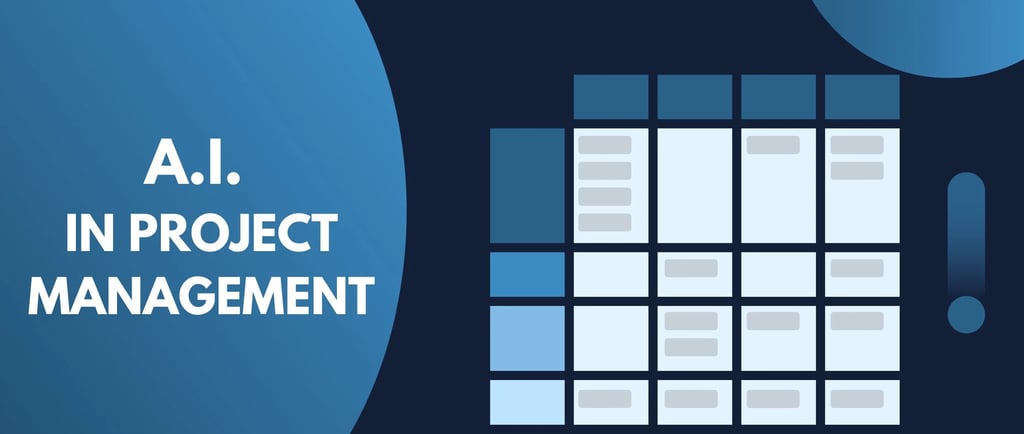The Role of Artificial Intelligence in Enhancing Project Management Efficiency
Unlock the potential of Artificial Intelligence in project management with our comprehensive guide tailored for small to medium-sized businesses. Discover how AI enhances decision-making, boosts efficiency, improves risk management, and facilitates better communication. Learn practical applications, implementation steps, and real-world case studies that demonstrate the transformative power of AI in project management. Dive into the future of AI and equip your business with the knowledge to stay competitive and achieve exceptional project outcomes.
BLOG
11/10/20245 min read


Introduction
Artificial Intelligence (AI) has permeated various sectors, revolutionizing the way we work, live, and interact. In the realm of project management, AI is proving to be a game-changer, offering tools and methodologies that significantly enhance efficiency, accuracy, and outcomes. For small to medium-sized businesses (SMBs), adopting AI in project management can lead to substantial improvements in productivity and competitiveness. This comprehensive blog will explore how AI is transforming project management, the benefits it brings, and practical applications for SMBs.
Understanding AI in Project Management
What is Artificial Intelligence?
Artificial Intelligence refers to the simulation of human intelligence in machines programmed to think and learn. These systems can perform tasks that typically require human intelligence, such as decision-making, speech recognition, visual perception, and language translation. In project management, AI can automate repetitive tasks, analyze large datasets, and provide insights that drive better decision-making.
The Evolution of AI in Project Management
AI in project management has evolved from simple automation tools to sophisticated systems capable of learning and improving over time. Initially, AI tools were used for scheduling and resource allocation. Today, they encompass a wide range of functionalities, including predictive analytics, risk management, and even human resource management.
The Benefits of AI in Project Management
Enhanced Decision-Making
One of the most significant advantages of AI in project management is its ability to enhance decision-making processes. AI algorithms can analyze vast amounts of data quickly, identifying patterns and trends that might not be apparent to human managers. This predictive capability allows project managers to make informed decisions, anticipate potential issues, and mitigate risks effectively.
Improved Efficiency and Productivity
AI-powered tools can automate routine and repetitive tasks, freeing up project managers to focus on more strategic activities. For instance, AI can handle scheduling, task assignments, and progress tracking, reducing the administrative burden on managers and increasing overall productivity.
Better Risk Management
AI can significantly improve risk management by predicting potential risks and suggesting mitigation strategies. By analyzing historical data and current project parameters, AI can identify risk factors and provide early warnings, allowing project managers to take proactive measures.
Enhanced Communication and Collaboration
AI tools can facilitate better communication and collaboration among team members. Features like chatbots and virtual assistants can provide instant answers to queries, schedule meetings, and even summarize project updates. This ensures that team members stay informed and aligned, improving overall project coherence.
Practical Applications of AI in Project Management for SMBs
Automated Scheduling and Resource Allocation
AI-powered scheduling tools can analyze project requirements, team availability, and deadlines to create optimal schedules. These tools can also allocate resources efficiently, ensuring that the right people are assigned to the right tasks. For SMBs, this means better utilization of limited resources and improved project timelines.
Predictive Analytics for Project Success
Predictive analytics tools use historical data to forecast project outcomes. They can predict potential delays, budget overruns, and resource shortages, allowing project managers to take corrective actions in advance. For SMBs, this proactive approach can lead to more successful project completions and satisfied clients.
AI-Driven Reporting and Analytics
AI can automate the generation of reports and analytics, providing real-time insights into project performance. These tools can track key performance indicators (KPIs), identify trends, and highlight areas that need attention. For SMBs, this means more accurate and timely reporting, leading to better project oversight.
Intelligent Document Management
AI can streamline document management by categorizing, tagging, and storing project documents automatically. This reduces the time spent on document organization and retrieval, ensuring that project information is easily accessible when needed. For SMBs, this can lead to significant time savings and improved project documentation.
Chatbots and Virtual Assistants
AI-powered chatbots and virtual assistants can handle a variety of tasks, from answering common questions to scheduling meetings and providing project updates. These tools can operate 24/7, ensuring that team members always have access to the information they need. For SMBs, this means improved communication and reduced administrative workload.
Implementing AI in Project Management: Steps for SMBs
Assess Your Needs
Before implementing AI, SMBs should assess their project management needs and identify areas where AI can add value. This could involve evaluating current processes, identifying pain points, and determining the specific AI tools that can address these challenges.
Choose the Right AI Tools
There are numerous AI tools available for project management, each offering different features and capabilities. SMBs should choose tools that align with their needs and budget. Some popular AI project management tools include Trello, Asana, Monday.com, and Wrike.
Train Your Team
Implementing AI requires a certain level of technical proficiency. SMBs should invest in training their team members to use AI tools effectively. This could involve online courses, workshops, or hiring a consultant to provide hands-on training.
Start Small
It's advisable to start with a pilot project when implementing AI. This allows SMBs to test the tools, identify any issues, and make necessary adjustments before rolling out AI across all projects.
Monitor and Evaluate
Once AI tools are implemented, SMBs should continuously monitor their performance and gather feedback from team members. This will help in identifying areas for improvement and ensuring that the AI tools are delivering the expected benefits.
Case Studies: AI in Action
Case Study 1: Improving Efficiency with AI-Powered Scheduling
A small marketing agency implemented an AI-powered scheduling tool to manage its project timelines. The tool analyzed team availability, project deadlines, and task dependencies to create optimal schedules. As a result, the agency saw a 30% increase in project completion rates and a significant reduction in scheduling conflicts.
Case Study 2: Enhancing Decision-Making with Predictive Analytics
A medium-sized software development company used predictive analytics to forecast project outcomes. By analyzing historical data, the AI tool predicted potential delays and budget overruns, allowing the project managers to take corrective actions. This proactive approach led to a 25% improvement in on-time project delivery and a 15% reduction in project costs.
Case Study 3: Streamlining Communication with AI Chatbots
A small IT consultancy deployed AI-powered chatbots to handle routine queries and provide project updates. The chatbots operated 24/7, ensuring that team members always had access to the information they needed. This led to improved communication, faster response times, and a 20% increase in team productivity.
Challenges and Considerations
Data Privacy and Security
Implementing AI in project management involves handling large amounts of data, raising concerns about data privacy and security. SMBs must ensure that their AI tools comply with data protection regulations and implement robust security measures to protect sensitive information.
Integration with Existing Systems
Integrating AI tools with existing project management systems can be challenging. SMBs should choose AI tools that offer seamless integration with their current systems to avoid disruptions and ensure smooth operations.
Cost
While AI tools can offer significant benefits, they can also be expensive. SMBs should carefully evaluate the cost-benefit ratio and ensure that the investment in AI tools aligns with their budget and business goals.
The Future of AI in Project Management
The future of AI in project management looks promising, with continuous advancements in AI technologies and increasing adoption across industries. For SMBs, staying updated with the latest AI trends and continuously exploring new AI applications can lead to sustained improvements in project management efficiency and competitiveness.
Emerging Trends
AI-Driven Project Insights: Advanced AI algorithms will provide deeper insights into project performance, helping managers make more informed decisions.
Voice-Activated Project Management: Voice-activated AI assistants will become more prevalent, allowing project managers to interact with AI tools through voice commands.
AI-Powered Project Simulations: AI will enable project managers to run simulations and predict the outcomes of different project scenarios, leading to better planning and risk management.
Preparing for the Future
To prepare for the future of AI in project management, SMBs should:
Stay informed about the latest AI advancements and trends.
Continuously invest in training and development to build AI proficiency within their teams.
Explore new AI tools and applications to stay competitive and improve project outcomes.
Conclusion
Artificial Intelligence is transforming project management, offering tools and capabilities that enhance efficiency, accuracy, and outcomes. For small to medium-sized businesses, adopting AI in project management can lead to significant improvements in productivity and competitiveness. By understanding the benefits, practical applications, and implementation steps, SMBs can leverage AI to achieve better project management results and drive business success.
Incorporating AI into project management is not just a trend but a strategic move towards a more efficient and effective future. As AI technologies continue to evolve, the potential for further improvements in project management is immense, making it an exciting time for SMBs to embrace AI and reap its benefits.
© 2025. All rights reserved.

